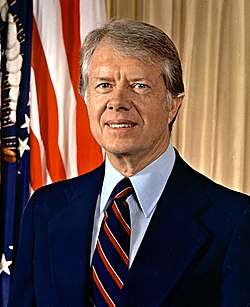Jimmy Carter Quote
It is interesting to note that an overwhelming majority of citizens in the world's three largest democracies have different religions: India (81 percent Hindu), the United States (76 percent Christian), and Indonesia (87 percent Muslim). Two of them have elected women as leaders of their government.
Jimmy Carter
It is interesting to note that an overwhelming majority of citizens in the world's three largest democracies have different religions: India (81 percent Hindu), the United States (76 percent Christian), and Indonesia (87 percent Muslim). Two of them have elected women as leaders of their government.
Related Quotes
The 10 ever greatest misplacements in life:1. Leadership without character.2. Followership without servant-being.3. Brotherhood without integrity.4. Affluence without wisdom.5. Authority without consc...
Israelmore Ayivor
Tags:
affluence, authority, brotherhood, change, change your life, character, characters, conscience, extra, extra mile
You can lead if you can serve. You can serve when you can love. You can love when you are graced. The truth is that God knows love will be needed in volumes, this is why he made his grace abundant. Le...
Israelmore Ayivor
Tags:
abundance, abundant, attitude, ballot, ballot paper, ballot papers, character, characters, clinton, election
A young child is a leader to an elderly person once his purpose has a faithful, sincere and trustworthy influence on people. Leadership is not restricted to position and age; it is self-made and influ...
Israelmore Ayivor
Tags:
a child, a young child, age, appoint, appointed, appointment, child, children, commander, elder
About Jimmy Carter
James Earl Carter Jr. (October 1, 1924 – December 29, 2024) was an American politician and humanitarian who served from 1977 to 1981 as the 39th president of the United States. A member of the Democratic Party, Carter served from 1971 to 1975 as the 76th governor of Georgia and from 1963 to 1967 in the Georgia State Senate. He was the longest-lived president in U.S. history and the first to reach the age of 100.
Born in Plains, Georgia, Carter graduated from the U.S. Naval Academy in 1946 and joined the submarine service before returning to his family's peanut farm. He was active in the civil rights movement, then served as state senator and governor before running for president in 1976. He secured the Democratic nomination as a dark horse before narrowly defeating Republican incumbent Gerald Ford in the general election.
As president, Carter pardoned all Vietnam draft evaders and negotiated major foreign policy agreements, including the Camp David Accords, the Panama Canal Treaties, and the second round of Strategic Arms Limitation Talks, and he established diplomatic relations with China. He created a national energy policy that included conservation, price control, and new technology. He signed bills that created the Departments of Energy and Education. The later years of his presidency were marked by several foreign policy crises, including the Soviet invasion of Afghanistan (leading to the end of détente and the 1980 Olympics boycott) and the fallout of the Iranian revolution (including the Iran hostage crisis and 1979 oil crisis). Carter sought reelection in 1980, defeating a primary challenge by Senator Ted Kennedy, but lost the election to Republican nominee Ronald Reagan.
Polls of historians and political scientists have ranked Carter's presidency below average. His post-presidency—the longest in U.S. history—is viewed more favorably. After Carter's presidential term ended, he established the Carter Center to promote human rights, earning him the 2002 Nobel Peace Prize. He traveled extensively to conduct peace negotiations, monitor elections, and end neglected tropical diseases, becoming a major contributor to the eradication of dracunculiasis. Carter was a key figure in the nonprofit housing organization Habitat for Humanity. He also wrote political memoirs and other books, commentary on the Israeli–Palestinian conflict, and poetry.
Born in Plains, Georgia, Carter graduated from the U.S. Naval Academy in 1946 and joined the submarine service before returning to his family's peanut farm. He was active in the civil rights movement, then served as state senator and governor before running for president in 1976. He secured the Democratic nomination as a dark horse before narrowly defeating Republican incumbent Gerald Ford in the general election.
As president, Carter pardoned all Vietnam draft evaders and negotiated major foreign policy agreements, including the Camp David Accords, the Panama Canal Treaties, and the second round of Strategic Arms Limitation Talks, and he established diplomatic relations with China. He created a national energy policy that included conservation, price control, and new technology. He signed bills that created the Departments of Energy and Education. The later years of his presidency were marked by several foreign policy crises, including the Soviet invasion of Afghanistan (leading to the end of détente and the 1980 Olympics boycott) and the fallout of the Iranian revolution (including the Iran hostage crisis and 1979 oil crisis). Carter sought reelection in 1980, defeating a primary challenge by Senator Ted Kennedy, but lost the election to Republican nominee Ronald Reagan.
Polls of historians and political scientists have ranked Carter's presidency below average. His post-presidency—the longest in U.S. history—is viewed more favorably. After Carter's presidential term ended, he established the Carter Center to promote human rights, earning him the 2002 Nobel Peace Prize. He traveled extensively to conduct peace negotiations, monitor elections, and end neglected tropical diseases, becoming a major contributor to the eradication of dracunculiasis. Carter was a key figure in the nonprofit housing organization Habitat for Humanity. He also wrote political memoirs and other books, commentary on the Israeli–Palestinian conflict, and poetry.
